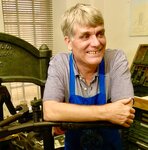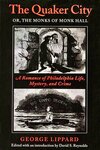

Distinguished literary scholar Michael Winship, a Chestnut Hill resident, will lead a discussion of the notorious best-seller “The Quaker City,” by George Lippard, at Ebenezer Maxwell Mansion, 200 W. Tulpehocken St., on Sunday, April 28, at 3 p.m.
You will not have seen this book on the New York Times best-seller list for the simple reason that it was a best-seller shortly after its publication in 1845, 179 years ago.
The book was based on the March 1843 New Jersey trial of Singleton Mercer, who was accused of the murder of Mahlon Hutchinson Heberton aboard the Philadelphia-Camden ferry vessel, Dido, on Feb. 10, 1843. You might say it was the O.J. Simpson “Trial of the Century” of the Victorian era. Extremely shocking at the time, the book featured sex, drugs, violence and various acts of debauchery in the city of Philadelphia.
According to Kenneth Eugene Silverman, a Pulitzer Prize-winning biographer, “The Quaker City” was the best-selling novel in America before “Uncle Tom's Cabin.” It sold 60,000 copies during its first year, and its success made Lippard one of the best-paid American writers of the 1840s, earning $3,000 to $4,000 a year.
Many people were offended by the story's lurid elements. The book also may have prompted new laws, such as New York's 1849 enactment of an anti-seduction law. A stage version was prepared but was banned in Philadelphia for fear of riots.
Lippard took advantage of the popularity of his book to establish his own weekly periodical, also named The Quaker City. He advertised it as “A popular journal, devoted to such matters of literature and news as will interest the great mass of readers.” Its first issue was published on Dec. 30, 1848.
Winship was born in Washington, D.C. His father was a foreign service officer, so he grew up living in many different locations here and abroad, although both of his parents’ families are from New England.
He has authored several books of his own, graduated with honors from Harvard University, and earned his doctorate from Oxford University in England. He led seminars on the history of the book and publishing at Yale University, Columbia University, and at the University of Virginia, and taught for many years in the English Literature department at the University of Texas before retiring in 2020.
Winship worked for 15 years to complete his “Bibliography of American Literature,” a multi-volume record of books produced between 1825 and 1960, which he calls “the industrial era of book publishing.”
“‘The Quaker City’ is an early example of a type of popular literature that became important in the U.S. in the antebellum years,” Winship told the Local. “As a book with something of a cult following, there were many myths about its publication history that I wanted to investigate.”
Why move from Texas to Chestnut Hill?
“Upon retiring from teaching, I wanted to move back to the East Coast,” Winship said. “I have friends here; Philadelphia is a good book town with good library resources and colleagues who are interested in the study of books as material texts. And Chestnut Hill has walkability, proximity to green spaces and good public transportation.”
Winship has won many awards, but the one he is most proud of was the biography prize from the International League of Antiquarian Booksellers (ILAB). “I was very honored, of course,” he said. “Booksellers are, without doubt, the most rigorous and critical judges of bibliographical work, and very few works by American authors have been recognized by ILAB with this prize.'"
For more information, go to ebenezermaxwellmansion.org. Len Lear can be reached at lenlear@chestnuthilllocal.com.